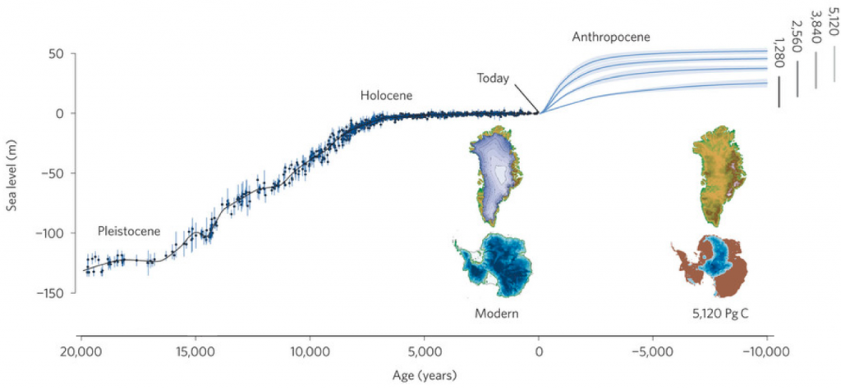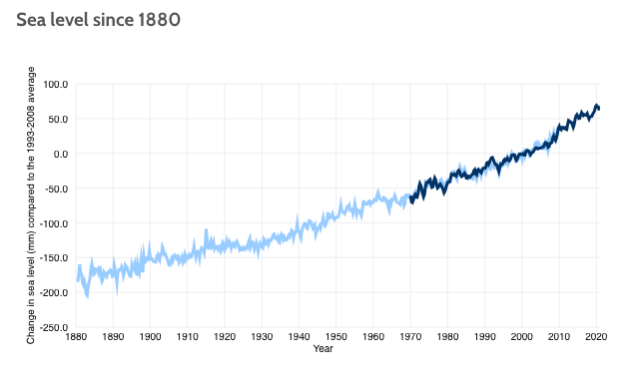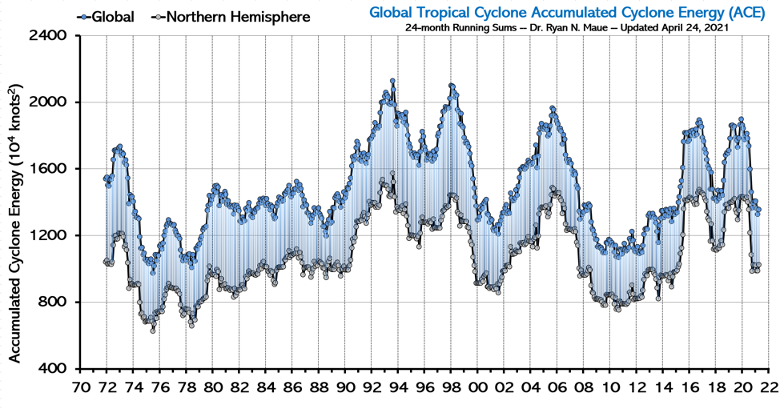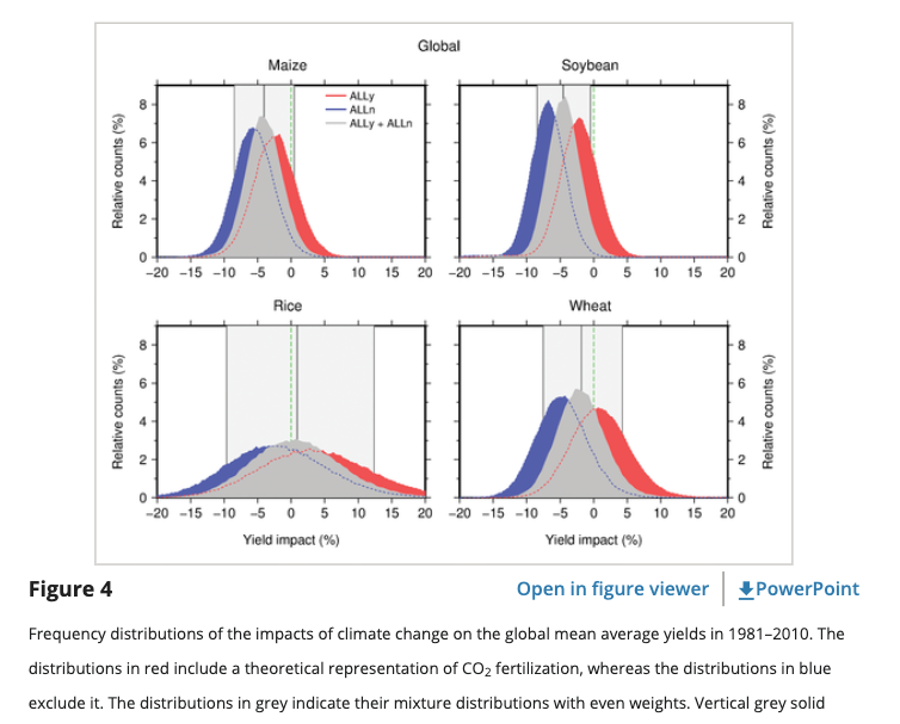A group called “Climate Feedback,” which has power to censor videos on Facebook, recently deemed a Stossel TV video “misleading” and “partly false.”
The video, “Are We Doomed,” had received 24 million views before the “fact checker” got Facebook to stop showing it to many people.
But strangely, a simple reading of Climate Feedback’s so-called fact check reveals not a single factual error in our video.
Instead, as one of their reviewers told us, “Broader claims are being disputed.”
Is Climate Feedback even right about their broad claims? No. At best, the group raises issues which are debatable. That calls for debate, not censorship.
1. Sea Level History
Statement in Stossel TV Video:
David Legates, professor of geography at the University of Delaware: “water has been rising for approximately 20,000 years, and probably will continue.”
Climate Feedback’s Claim:
“[That’s] imprecise and misleading … it implies sea levels have continued rising since then …”
Reality:
Sea levels HAVE continued rising. The fact-checkers’ own sea level graphs show that, even if the increase over the last 6,000 was slower.
Here’s Climate Feedback’s source for the last 20,000 years:

Climate Feedback also asserts that “in the last 6,000 years, global sea level was stable … until an increase in the rate of sea-level rise 100–150 years ago.”
But their own source shows it rose about 10 feet over the last 6,000 years. [p.15301 of this PNAS academic source, the source that Climate Feedback’s source cites for its data, per its footnote 60.]
Climate Feedback’s False Claim:
“[Stossel] implies … current sea level rise is just a continuation of past natural fluctuations …”
Reality:
We don’t imply that. We said nothing about that. We simply said that humans have successfully adapted to rising sea levels. It’s happened for millennia.
Legates’ 20,000 feet comment comes as a segue to “we can adapt, like Holland has.” We never say that sea level will keep rising at the same rate.
Data do show that sea level rose steadily over the last 150 years, at a very constant rate. From Climate.gov:

Yet this has hardly been a crisis for humanity; living standards skyrocketed during the same period.
Climate Feedback’s Claim:
“The causes of the global warming event that explains sea level rise at the end of the last ice age 20,000 years ago are different from those that explain sea level rise now.”
Reality:
Our video doesn’t say or imply anything to the contrary.
2. Dutch Adaptation
Statement in Stossel TV Video:
“Even if the planet warmed by 5 degrees, humans can adjust. People in Holland did … ”
Climate Feedback’s Misleading Claim:
Climate Feedback first quotes a professor who says “False. Comparison of long tide gauge records … indicates that the rate of rise … since ~1850 … was significantly faster than it was during … the 4000–2000 years prior to ~1850 …”
Reality:
Climate Feedback admits that this is “a previous evaluation of a similar claim” — but it’s not similar to the adaptation question. He’s only evaluating whether sea level rise was faster since 1850 than before.
Sea level rise was faster after 1850 than before, but that has nothing to with our point: Humans adapted.
In fact, as the image below shows, Holland gained the most landmass specifically since 1850, when sea levels rose fastest!
Climate Feedback’s Misleading Claim:
Climate Feedback then cites Patrick Brown, assistant professor at San Jose State University, who argues: “There are sufficient fossil fuels available to completely melt the Greenland and Antarctica ice sheets and raise global sea levels approximately 60 meters or 200 feet[18]. This would represent an astronomical cost …”
Reality:
Obviously, if sea level rose 200 feet, that would be astronomically costly. But the UN IPCC does not consider that likely at all.
Brown subsequently told us that his 200-feet increase scenario is plausible over a period of a thousand years.
This is far outside the range of what the UN IPCC projects, with good reason. Imagine how different technology will be in a thousand years.
1,000 years from now, humans will probably have machines that suck carbon out of the air.
A thousand years ago, the height of technology was the crossbow.
It’s more reasonable to consider projections for a century, which Brown himself cites: a rise of about 1-3 feet.
How does “adaptation” do as a strategy in that case?
Statistician and environmentalist Bjorn Lomborg cites a 2018 study in the journal Global Environmental Change that finds (his summary):
The total cost of coastal protection and of all remaining flood damage through the rest of the century, even in the absolutely worst-case scenario, will cost the United States just 0.037 percent of its GDP, and possibly five times less.
That’s a small price to pay, compared to reorganizing the entire economy to try to eliminate emissions.
3. Hurricane Activity
Statement in Stossel TV Video:
Patrick Michaels (former president of the American Association of State Climatologists) says, “There is no relationship between hurricane activity and the surface temperature of the planet.”
Climate Feedback’s Misleading Claim:
“[This] misleads viewers by cherry-picking a single measure of hurricane activity and ignoring the broader corpus of scientific research that demonstrates the expected increase in risks related to hurricanes …”
Reality:
Michaels said hurricane activity and power are not up. In our video, we illustrate that with a graph showing that number of hurricanes is not up. Climate Feedback admits that this is accurate, but accuses Michaels of “cherry picking” and ignoring other stats.
So let’s look at hurricane energy:

[Source: Recent historically low global tropical cyclone activity, Ryan N. Maue, published 20 July 2011, GEOPHYSICAL RESEARCH LETTERS, VOL. 38, L14803, doi:10.1029/2011GL047711, 2011 ]
No increase.
Climate Feedback’s Claim:
“… scientists expect that ‘sea level rise accompanying the warming will lead to higher storm inundation levels’ and that the global proportion of hurricanes that reach very intense (category 4–5) levels will increase, as described in Knutson et al. (2020)[2,3]. Scientists also expect increased precipitation rates in hurricanes[4].”
Reality:
That’s possible, but not necessarily likely. Climate Feedback omits more cautious studies and evaluations.
The EPA notes that North Atlantic hurricane intensity might have risen. Figure 3: https://www.epa.gov/climate-indicators/climate-change-indicators-tropical-cyclone-activity
But the EPA is unsure: “Despite the apparent increases in tropical cyclone [means hurricane] activity in recent years, shown in Figures 2 and 3, changes in observation methods over time make it difficult to know whether tropical storm activity has actually shown an increase over time.”
The UN’s IPCC does have “medium confidence” that the average intensity of tropical cyclones (hurricanes) will increase, but notes that they have “low confidence” about activity – the word Michaels used. The UN’s IPCC 2018 report:
“There is low confidence that any observed long-term (i.e., 40 years or more) increases in tropical cyclone activity are robust, after accounting for past changes in observing capabilities”
4. Helps Crops
Claim in Stossel TV Video:
“Carbon dioxide is a greenhouse gas, but it also helps feed the world.”
Climate Feedback’s Misleading Claim:
“[Stossel TV’s claim] relies on cherry-picking some effects of CO2 on plants, while completely ignoring others … Climate change can also increase heat stress, water stress, and pest prevalence, which can reduce crop yields.”
Reality:
Climate Feedback spends many words on possible negative effects of warming on crops, but almost none on the studies that put it all together. Near the end, they quote Patrick Brown, assistant professor at San Jose State University, who cites one study on the overall effect:
Global crop models take into account many potential changes (including the fertilization effect from CO2) and tend to indicate that the net effect of increased CO2 (including its climate affects) will cause yields to decrease[5]:
“At the global scale, Iizumi et al. (2018) used a counterfactual analysis and found that climate change between 1981 and 2010 has decreased global mean yields of maize, wheat, and soybeans by 4.1, 1.8 and 4.5%, respectively, relative to preindustrial climate, even when CO2 fertilization and agronomix adjustments are considered.”[22]
This study does find “likely” small negative effects of CO2 on crops.
But let’s look at how the study got their numbers. They ran 300 different computer simulations based on different assumptions about the world, and how CO2 operates on crops.
Many of those simulations found a positive effect on crop growth.

The graphs above show distributions of the scientists’ 300 simulations regarding whether the impact is positive or negative. Anything to the right of zero means CO2 is positive for the crop– to the left means it’s harmful.
Only the red distribution fully includes the positive impact on CO2 on plant growth that Stossel TV cited. (Blue ignores the positive effect, which is clearly wrong to do, and grey assumes just half of the normally-estimated positive impact.)
Note that for wheat and rice (bottom-left and bottom-right), MOST simulations that included the positive impact of CO2 found that it is GOOD for crops. They found similarly small, but negative, effects for corn and soybeans.
In sum: when the positive impact of CO2 is included, the study actually found that CO2 is slightly good for rice and wheat growing, and slightly bad for corn and soybean crops.
The graphs also give a sense of the enormous uncertainty. The study finds that it’s very possible that CO2 helps all crops, or hurts all crops, on net. We don’t know.
Climate Feedback wrongly emphasizes negative effects.
As with hurricanes – this is an issue that people should debate! Censoring one side of the question is not the solution.
5. Debate
Claim in Stossel TV Video:
Stossel: “Climate alarmists never agree to debate. We would love to offer you the airtime.”
Their Misleading Critique:
“Stossel complains that scientists don’t want to debate with him; however, this is not how scientific debate works. Scientific debate doesn’t primarily happen on YouTube videos or social media platforms, or through discussions between scientists and news commentators. Instead, researchers who engage in a scientific debate traditionally do so by submitting articles to academic journals … climate contrarian bloggers don’t conduct their own research or submit properly written accounts of their findings to academic journals, eschewing the peer review process.”
Reality:
Their writeup implies our experts are merely “climate bloggers”. That’s wrong. Nothing in our video, or in the above research, comes from “climate bloggers”.
It comes from:
- David Legates, professor of geography at the University of Delaware. He frequently publishes about climate in peer-reviewed academic journals.
- Willie Soon, of the Harvard-Smithsonian Center for Astrophysics, and who also publishes in peer-reviewed academic journals.
- Patrick Michaels, former president of the American Association of State Climatologists.
Do they make mistakes? Surely. But they also make good points, which is why we produced “Are We Doomed”.
All statistics in our video cite official US government or UN data.
Some points in our video are debatable. We welcome a debate! We’re open to the idea that hurricane intensity is rising, and that CO2 hurts crops. People should keep an open mind about these issues.
Unfortunately, Climate Feedback’s response to our video shows that they are unwilling to debate. Sadly, they are now empowered to censor views they disagree with!
That’s wrong.
Nothing in our video was factually inaccurate.
We’ll keep reporting the facts. We hope social media sites allow it.
